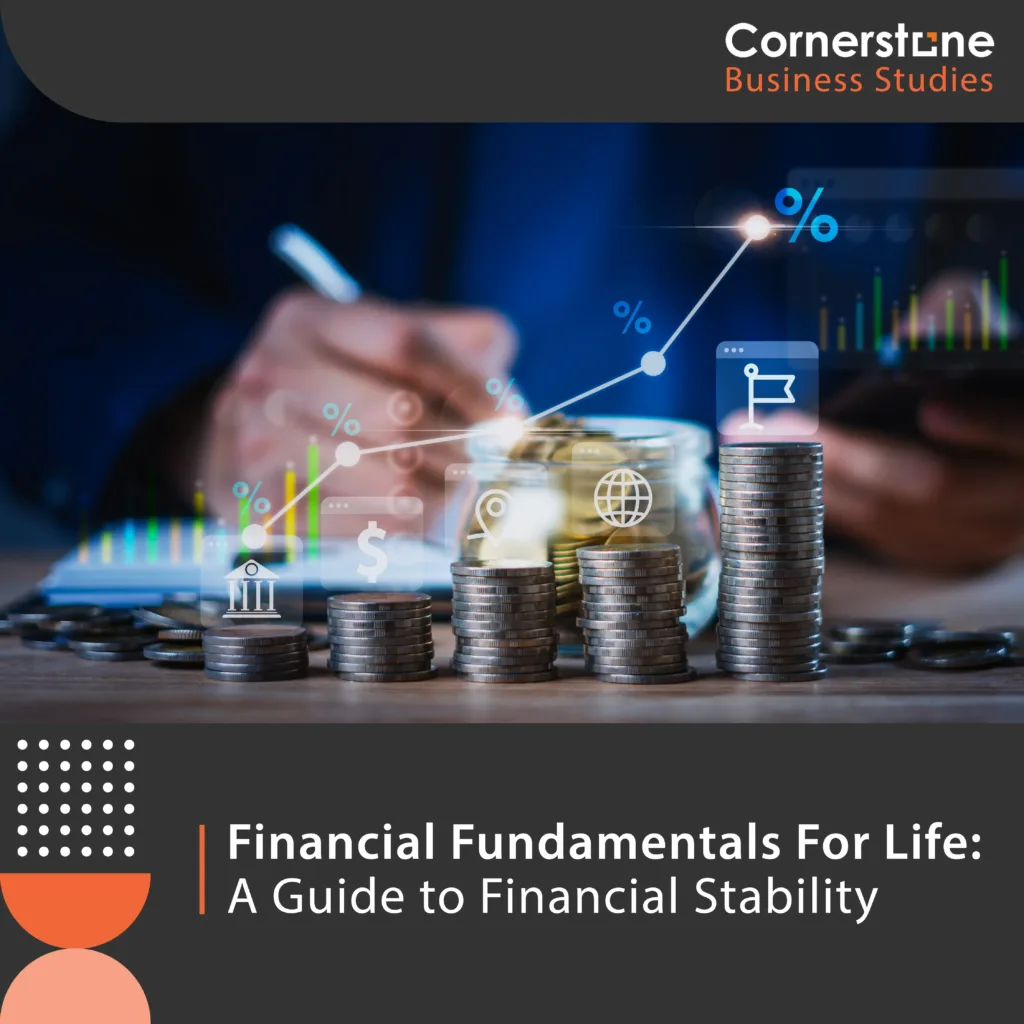Financial Fundamentals for Life: A Guide to Financial Stability

Financial Fundamentals for Life: A Guide to Financial Stability
Financial literacy is no longer optional – lt is a necessity for surviving and thriving in today’s fast-paced world. This is particularly relevant in South Africa, where over 20 million South Africans are debt-active, and 80% of middle-class workers’ net take-home pay is used for servicing debt (Eighty20,2023). Rising costs, unpredictable economic conditions, and a growing culture of consumerism make it essential to adopt sound financial practices.
This article explores key aspects of financial management, such as budgeting, saving, investing, and debt management, tailored to the South African context. It also highlights career opportunities for business graduates and suggests how to select an institution which will support the development of financial literacy skills essential for both personal and professional life.
Budgeting: Structuring financial discipline for the South African context
Effective budgeting is at the core of financial stability. In South Africa, where economic challenges such as inflation and unemployment are common, budgeting becomes even more critical. The key is to approach budgeting with discipline, using professional tools like zero-based budgeting. This approach requires individuals to justify each expense within their budget, ensuring that every rand is allocated toward a defined purpose.
Zero-based budgeting forces individuals to reassess their priorities regularly, ensuring that non-essential expenses are eliminated. For example, a household budget might start by allocating funds for housing, utilities, food, and transport first. Only after these essentials are covered, can discretionarily spending, such as entertainment or leisure, be considered.
Saving: Securing your financial future
In a country with rising costs and economic uncertainties, establishing an emergency fund is critical. Financial experts recommend setting aside three to six months’ worth of living expenses as a safeguard against job loss, medical emergencies, or unplanned financial demands.
Building a robust savings strategy helps individuals and families navigate economic fluctuations and achieve financial independence over time.
Various financial service providers offer tailored savings solutions, allowing individuals to make informed decisions about their savings strategy. Consulting with certified financial planners can also help maximise returns and secure a financially stable future.
Investing: Growing wealth strategically
Beyond saving, investing is a crucial aspect of wealth creation, especially in a high -inflation environment. Investing in a mix of assets, such as equities, bonds, property, and even entrepreneurial ventures, can help individuals not only to protect their savings from inflation but also grow their wealth over time.
One major avenue for local investment is the Johannesburg Stock Exchange (JSE), which provides a platform for buying shares in leading South African companies. Real estate is another option which can be lucrative, especially in urban areas where property values have shown steady growth.
To manage investments risks, individuals should adopt a diversified strategy, balancing high- growth assets with more stable options like government bonds or savings accounts. This approach ensures long-term growth while protecting against market volatility. Investing wisely and early also allows individuals to take advantage of compound interest, where earnings on investments grow exponentially over time.
Debt Management: Harnessing the power of good debt
In South Africa, many rely on credit to finance their homes, education, and even daily expenses. However, mismanaging debt can lead to financial distress. Understanding the difference between good debt and bad debt is essential.
Good debt, such as student loans or home loans, enables individuals to invest in their future. These types of debt are typically associated with lower interest rates and contribute to long-term wealth creation. On the other hand, bad debt-often incurred through high-interest credit cards or personal loans for consumption -can quickly become unmanageable if not properly controlled.
Professional debt management strategies, such as consolidating loans or refinancing at a lower interest rate, can provide relief. Additionally, leveraging tools like the National Credit Regulator (NCR) and debt counselling services in South Africa can help individuals regain control of their debt and work towards financial independence.
Career Opportunities for Business Graduates in Finance
The financial landscape in South Africa offers numerous opportunities for business graduates. Those with expertise in financial management, accounting, and economics are well-positioned to pursue careers in corporate finance, investment banking, financial consulting, and asset management.
With the rise of digital platforms and mobile banking, financial expertise is becoming increasingly critical in sectors such as microfinance and venture capital. Companies are often eager to hire professionals who can navigate these changes and help businesses remain competitive in the global market.
Selecting the Right Institution to study for Financial Literacy
If you are looking to study finance or business, make sure that you select an institution with a good track record. Bear in mind also that research indicates that students with finance in their degrees tend to secure jobs more quickly than their peers in other fields (Business Tech 2021).Review the courses which are offered, and make sure that they will provide you with a solid set of foundations to take forward your career and to equip you with a practical set of skills that you can use not only at work but also in your everyday life.
In conclusion, financial literacy is more than just understanding numbers; it is about taking control of your financial future. Whether it is through disciplined budgeting, strategic investing, or responsible debt management, mastering these financial fundamentals can lead to greater personal stability and opportunities for growth.
Reference List:
Abrahams, (2023) Financial literacy in South Africa: Closing the knowledge gap. Johannesburg: Juta Publishers.
Business Tech (2021) The chances of employment in South Africa based on your level of education.
Eighty20 (2023) South Africa’s Credit Active Consumers: Trends and Insights.
Financial Sector Conduct Authority (FSCA) (2023) Financial education insights and strategies for South Africa.
Old Mutual (2023) Saving and investment monitor: Insights into South Africans’ financial habits.
Parker, M.and Fenn, J. (2023) Developing financial resilience: A South African case study. Journal of Economic Behaviour ,34(3), pp.254-270.
Apply for our Business Studies programmes here: https://buff.ly/3QEpmE5
